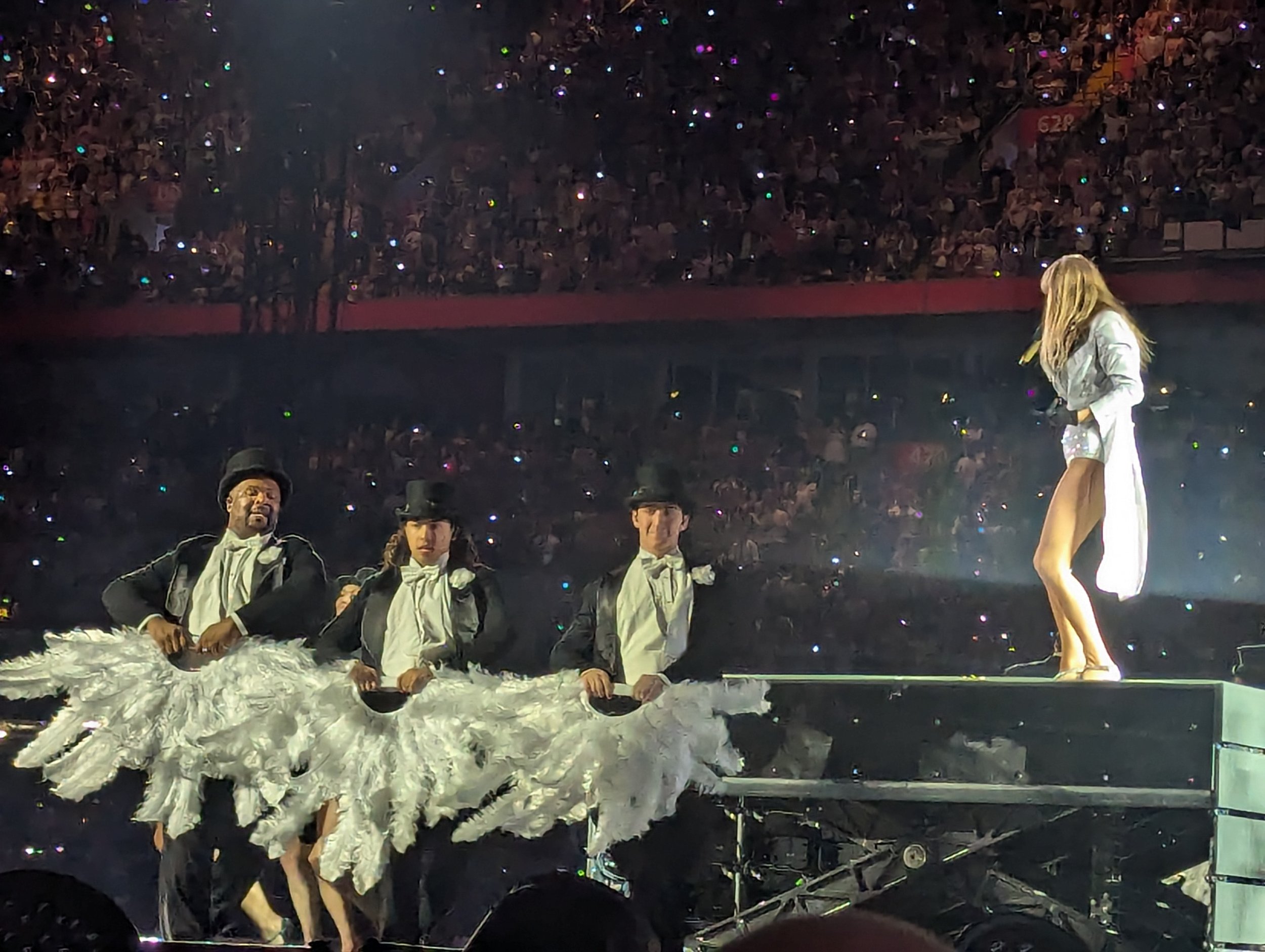Invisible String: The misogyny undermining the simple pleasure of being a Taylor Swift fan
In the lead-up to attending the Eras Tour, I found myself getting frustrated with the overexposure of Taylor Swift and the incessant speculation and criticism surrounding her stance—or perceived lack thereof—on political issues. Adding to my unease was the fact I had been openly questioned about whether it was even morally acceptable to attend a show. Both friends and acquaintances were confidently proclaiming their disgust at her private jet usage, billionaire status and assumed political neutrality. For people that openly admitted to not listening to her music, everyone seemed to think they knew a lot about her - it made me deeply uncomfortable and it made me want to do some Vigilante Shit.
Honestly, I wish Swift would call for an immediate ceasefire and consistently mobilise her fans to be inclusive and engage in activism. I’d even be comfortable if she spoon-fed Swifties facts on her socials to inspire them to sign petitions, and donate to good causes, I would lap it up if she gave rousing political soliloquies between songs at every single 100+ date on her Eras tour. But, do not have this desire for the right reasons, because I do not actually believe that if she did these things it would stop Israel committing genocide, or it would inevitably mean the right president got in and each cause got the full financial support it deserved; it’s just that if she did do these things, maybe I could have just told people I was excited about the shows and gone and enjoyed them in Peace, without the needling of their disapproval in the back of my mind.
What has struck me most profoundly about my experience as a Swiftie is not just the intensity of the critiques around Taylor Swift, but the glaring double standard when it comes to putting her male counterparts under the same microscope. I have not once seen the same vehement scrutiny for Bad Bunny, The Weeknd or Drake - all of whom have also dominated the spot as most globally streamed artist in the world on Spotify (Taylor is the only woman to have snatched the title once in the last ten years). Drake and Bad Bunny have achieved this feat a record of three times each, with Bad Bunny being the only artist to do so in consecutive years (2020–2022) - It seems too trite to point out, but, once again, it’s the woman who is expected to do her day job and engage in other forms of labour to justify her success. I find it incredible that a singer is expected to simultaneously educate and utilise her fanbase to achieve anything other than record sales, because, unlike politicians, she has not positioned herself as someone who aims to speak for and on behalf of the general public. There is consistent and palpable disgust for her success clamouring to be heard among all the adoration, how dare she want to just make music. How frivolous and distasteful, in a capitalist society. How infantile her fans and defenders are for accepting this…
Taylor Swift is a phenomenon and, as such, the attention she commands is not entirely unusual, but the sheer volume of commentary out there about her daily, across both mainstream and social media, is bizarre. Worse still, a horrendous amount of articles, posts, vlogs, videos, podcasts and interviews that discuss her, still include speculations on whether or not she writes her own songs, is secretly gay, is pregnant, did date/is dating and who her friends are and where they were last seen, rather than being about her music or what she has actually said. I understand the fatigue if you’re not a Swiftie. I also understand that Swifties themselves are complicit in the overexposure. However, I don’t think it’s fair to dismiss the impact it will inevitably take on her, just listen to I Can Do It With a Broken Heart or Who’s Afraid of Little Old Me? (Both on TTPD) She is clearly not immune to the noise. Nor do I think it’s fair to blame Taylor Swift for the frenzy that surrounds her.
Firstly, I think everyone needs to take some personal accountability for what the algorithm is showing them. Secondly, I think everyone needs to think more critically about the sources from which they consume information. To me, it’s blindingly obvious that many people are making a name and money by producing content about Taylor Swift, many without doing a single shred of research or considering the necessary due diligence they should be undertaking before they push out further chatter about her. I feel people are cynically focused on Swift for clicks, showing little journalistic integrity.
The scrutiny reached fever pitch when articles and hysterics on socials claimed her relationship with Travis Kelce, and their PDA at the Super Bowl was an intentional distraction from the bombing of Rafah, implying that her absence could have stopped the violence in Gaza. Imagine reading this about yourself, no really, sit with it… By this logic, she shouldn't be seen in public enjoying her life for the duration of the conflict unless she wants to be accused of supporting a genocide. By this logic, should the Super Bowl have stopped? Should none of us attend celebratory events? Swift has limited her public appearances to her professional commitments and watching her boyfriend in his, she was notably absent from the MET Gala, yet fans and the media perpetuate an obsessive focus on her make it seem like she is everywhere all the time and then argue she is the one vying for attention or else would stay at home!
There’s something ironic about the puritanical outrage of Swift not seeming to care for others while people constantly hate post about her, drawing more attention and discourse to her, rather than focusing on things of importance that they genuinely believe should be discussed. Does power only matter when it’s huge, is it not important on an individual level? It’s wild to me how many feminist outlets repeatedly attack Swift and how many have simultaneously failed to highlight Marilyn Manson’s obscene abuses of power with the same tenacity and regularity.
A perfect example of this blithe character assassination is The Polyester Podcast episode ‘The Taylor Swift Tipping Point’. I was genuinely shocked to hear the hosts repeatedly make absurd claims like, “so much of her career is people filling in the blanks for her” (and they weren’t even savvy enough to say Blank Space!). They also bemoaned that she has based her personality around her cats when, “there’s so much more to a girl than their breakups and their cats” - the longer I listened the more annoyed I became. The hosts of this podcast, a monetised venture with sponsors, (that describes itself as being formed via “a pop culture informed feminist lens”) - were so confident there would be an audience for their ramblings that they didn’t bother reflecting upon whether it displayed any journalistic integrity to undermine a discography from an 18 year portfolio by making such a reductive and patronising statement, because all attention is good attention right? (Even if it is just Swifties coming to moan).
The hosts even boasted about not having bothered to watch the documentary ‘Miss Americana’ because it was too “boring” and yet continued to dangerously assert Swift is intentionally apolitical, which is simply factually inaccurate, and they would have known this if they watched the documentary in its entirety. It’s a tired and sexist argument that Swift has challenged many times, to say she only writes songs about breakups - cursory investigation tells you that there are songs on every single album that are not just mining her own experience with relationships ending, examples include:
"Long Live" (from Speak Now): Celebrates the professional journey she has undertaken with her band and team.
"Ronan" (single): Written for a young boy who died of cancer, highlighting his mother's perspective.
"The Lucky One" (from Red): A commentary on the dark side of fame.
"Seven" (from Folklore): Reflects on childhood memories and lost innocence.
”The Best Day" (from Fearless): A tribute to her mother, expressing gratitude for her support.
"Soon You'll Get Better" (from Lover): Written about her mother's battle with cancer.
"Shake It Off" (from 1989): An upbeat anthem about brushing off criticism and negativity.
"Starlight" (from Red): Imagines the romance of Ethel and Bobby Kennedy.
"The Last Great American Dynasty" (from Folklore): Tells the story of Rebekah Harkness, the previous owner of Swift's Rhode Island home.
Don’t even get me started on Reputation and TTPD - bursting with social commentary on fame and the female experience! There’s also songs that are very obviously political and have been received that way and embraced, by her fans:
"Miss Americana & The Heartbreak Prince" (from Lover): A political allegory commenting on the state of America, using high school imagery to discuss broader political themes. - She opens the Eras tour with this, signifying the importance of this track to her.
“Only the Young" (single): Encourages young people to stay politically engaged and fight for change, inspired by her frustration with the state of American politics and addressing school shootings head on.
"You Need to Calm Down" (from Lover): Advocates for LGBTQ+ rights and criticises online hate, homophobia and the way the media pit women against each other.
"The Man" (from Lover): Addresses gender inequality and the double standards women face in society and the entertainment industry, she even take a direct swipe at Leonard DiCaprio.
Even if Swift was “just” writing about breakups, is it not valid for someone to write from their lived experience? It’s very disingenuous to me to hear feminists lament her doing this, as if having a lofty goal to write about something deemed intellectual is the only way to really count. I feel women have fought hard to be allowed to talk about their experiences, the move to talk openly about periods and menopause is still underway. Kitchen sink dramas and soap operas that allowed the private sphere of the home to be viewed, understood and explored have challenged taboos, fostered understanding between different groups, created empathy and even sparked social change. Was all of this progress for us to then chastise and belittle women who want to explore their own internal worlds through music? Think about how the circumstances of Jade Goody’s death prompted so many women to go for smear tests, or how the storyline about sepsis in Coronation Street led to a spike donations to the UK Sepsis Trust - the vehicle for political engagement can the the product produced, it doesn’t have the be the creator inserting themselves into every conversation.
It feels incongruent to me that Polyester was dismissive of the female experience that Swift so keenly observes and wants to invite others into a conversation about. Polyester made it seem like she is vacuous; by proxy inferring that those of us who can identify with Swift’s experience are also somehow empty and lesser. The hosts concede that Swift did drive a spike in voter registration when she urged people to register to vote, but then used this example to argue, without any hint of nuance (and assuming the trajectory would always be linear), that this is exactly why she should call for a ceasefire - Surely, not even they can believe this? I think the whole episode is a cynical example of people using Swift’s fame to piggyback off. In my mind, feminists who claim to be intersectional should not stoop this low - Swift is not responsible for her fans and nor should she be, this is not the emotional labour we should be forcing on women - Also, seeing as her fanbase is predominantly women, I find it patronising that Polyester assume Swifties need Taylor to make us care about political issues; are we all airheads that can only form opinions if a pop star we like to sing along to shares some virtue signalling clickbait shit on socials, or interrupts awards shows to yell for a ceasefire while wearing a gown and jewels produced on the back of exploited workers? The audacity.
Also, the screaming about how she could be having an impact is purposefully not taking into consideration that when Swift does speak on gender issues, her Swift army hasn’t somehow managed to get Roe V Wade reinstated, and she didn’t even manage to get the candidate she endorsed into a seat (as depicted in Miss Americana). At introductory level Media Studies you learn that the hypodermic needle model is bullshit and how silly moral panics are, yet, media pundits are making money by pretending if Swift says, “jump“ all her fans say, “how high”. These commentators also gleefully saw the drama of Swifties writing her an open letter to stop her dating Matty Healy (the 1975s) unfold in 2023, they cashed in on think pieces about how her fall from grace was finally coming - this example makes it abundantly clear that Swifties have minds of their own and don’t just passively consume Taylor’s narrative in the way she may wish we did. (In fact, Taylor has repeatedly written about the restrictive nature of people perceiving and monitoring her in intrusive ways erodes her self-esteem and makes her certain her fame can’t last.)
Hearing I Hate it Here live, in Cardiff on 18th June, (the first time she ever played it) inspired this.
While other artists of similar stature can navigate their careers without such relentless interrogation, Swift finds herself in a different spotlight altogether. BLM Cardiff literally asked people to come and picket the Cardiff show at The Principality Stadium on 18th June. In a post on Instagram they even stated “she’s in her genocide era” - even the most diehard Swiftie was going to balk at the thought. I read their call to arms carefully, “Taylor Swift's Eras Tour is sponsored by Capital One, and is the highest grossing tour by a woman in history. Capital One bank invests $500 million into Elbit Systems, the arms company responsible providing approximately 85% of the drones and land based weapons they have used to slaughter 35,000 innocent Palestinians, including over 13,000 children. Swift makes an obscene $27 million per show on the Eras tour, yet cannot afford to stand against a genocide?”
Let's dissect the unrealistic expectations imposed upon Swift here. Firstly, she's been targeted despite not being directly funded by entities boycotted by the BDS movement (who have been highlighting how to do this strategically since 2005). Unlike other figures who've made political statements or taken sides, Swift's neutrality—often construed as indifference—has sparked fervent debate and I don’t see how she can possibly do anything that stops the baying for her blood. The recent backlash and digital blockades under hashtags like #blockout (to get people to unfollow celebrities who haven’t called for a ceasefire) further illustrate a dangerous trend. While urging celebrities to leverage their platforms for social good is valid, the coercive nature of these campaigns risks reducing activism to mere virtue-signalling. It’s impractical to expect Swift—or any celebrity—to consistently align with every global cause, irrespective of personal beliefs or artistic focus.
It seems disingenuous for people to only post when pressure is applied and it’s a slippery slope if they do, because what topics should they abstain from speaking on, how can they justify it? Who will gatekeep and decide on what it’s ok for you to weigh in on and ok to bypass? If your fanbase doesn’t care, you will not be lobbied, #swiftiesforpalestine has good intentions but what about #swiftiesforsudan and #swiftiesforpoverty? No matter how appalling what is happening in Gaza is, it’s still true that there will consistently be atrocities and political issues that someone with a global reach like Taylor Swift could speak on, and acknowledging that makes it glaringly obvious how crippling being expected to do so would be. How would she even have time to do the research needed to be fully informed? How would she continue to tour and make music?
The disparity of focus on Swift becomes more apparent when we compare her treatment to that of other celebrities. Pink, for instance, recently performed in Cardiff without facing calls for a boycott, nor was her arrival in a private jet widely discussed. Roger Waters, a commendably outspoken advocate for Palestinian rights, operates from a longstanding, overtly political standpoint—yet his approach doesn’t invite the same coverage as the level of scrutiny as Swift’s silence has. There is no reason more people aren’t uplifting the voices of those they like, or those that are furthering a conversation they value, or spending their time researching organisations and reading academic papers to develop nuance in their own arguments and enrich their participation in activism, rather than trotting out the same old tired argument that it’s someone other than them that should be caring, taking action and using their platform for good - Choosing instead to systematically dissect Swift’s actions and project meaning on to them is bordering on trolling and it makes me queasy. There’s so much ‘what aboutism’ surrounding Swift, it’s exhausting.
Looping back to the Polyester Podcast here, something particularly acerbic that they argued was that Swift’s popularity hinges around her being a blank canvas people can project whatever they want onto, so they like her not because she has talent, but because she can be interpreted in any way people choose, and that she’s “apolitical” intentionally, to keep it this way and continue to accrue wealth and status. Mean.
Swift literally has an album called Reputation, and fiercely guards her image and lashes out at her detractors, she is not as demure as they assume, it’s them projecting this on to her because they are making assumptions based on her clothing and not her lyrics, interviews or extensive history of posts on Tumblr. I also don’t think it could be argued to be apolitical when she has supported food banks globally throughout the Eras tour (without disclosing it). Nor was it apolitical when she managed to get her record-breaking Eras documentary filmed, without any Bad Blood, during the writers strike. A feat she achieved by merely meeting all the demands of the unions and paying everyone involved in the production fairly. Taylor Swift did this while companies like Netflix had the majority of their projects halted, and allowed their staff to make ends meet by living off fundraising efforts from their unions, during a cost of living crisis and in the aftermath of a pandemic. I wonder if the same people citing her immorality have also cancelled their Netflix subscriptions? I assume they NEVER use Amazon too.
Swift’s detractors argue that her global influence mandates a vocal stance on every significant issue, but this overlooks several critical points. Her career’s foundation rests primarily on personal narrative and emotional resonance rather than overt political commentary. While commendable shifts in her songwriting indicate growing social awareness, expecting her to navigate complex global conflicts with the same ease as writing chart-topping hits is unrealistic and would seem disingenuous and be attacked as such. She has already been accused of chasing the pink pound after becoming more vocal in her support of the LGBTQ+ community.
Moreover, the potential consequences of Swift taking a political stance are profound and not to be trivialised. The frenzy surrounding her bears a striking resemblance to the Beatlemania that engulfed John Lennon, with both artists commanding immense fan followings, dominating media coverage, and reshaping the music industry. Swift’s creative genius parallels Lennon’s innovative contributions to music and culture, but the relentless media attention is also alarmingly similar. Lennon's infamous remark about the Beatles’ being “more popular than Jesus” sparked intense media frenzy, culminating in his tragic assassination, a chilling consequence of unchecked behaviour within the fandom and invasive reporting. Similarly, the deconstruction of Swift’s personal life often overshadows her professional achievements, with the modern digital age amplifying this scrutiny exponentially. If we continue to normalise and fuel such obsessive reporting, much of which excludes facts or any of Taylor’s own words, we risk repeating history. Guilty as Sin?
In a 2019 interview with Elle, Taylor admitted, ““I carry QuikClot army-grade bandage dressing, which is for gunshot or stab wounds. Websites and tabloids have taken it upon themselves to post every home address I’ve ever had online. You get enough stalkers trying to break into your house and you kind of start prepping for bad things.”
Death threats aside, I can see why an artist of her stature might not want to incur concert disruptions or risk being pigeonholed as performative and risk reputational damage. Such pressures are hardly conducive to fostering genuine dialogue or encouraging artists to engage meaningfully in social issues, and it’s insane to pretend fame and wealth could insulate her from these fears, many many people make their livings of the back of Taylor Swift, and a misstep from her brings an end to all of that. Britney’s tale laid out in black and white just how many people advise and control the golden goose, and every single one of them knows; they’re burning all the witches, even if you aren’t one.
Criticism of Swift’s carbon footprint, particularly her use of private jets, further amplifies the selective scrutiny she faces. While environmental concerns are valid, such critiques often seem less about genuine activism and more about projecting personal expectations onto a public figure. There’s no denying that in 2022 Taylor Swift was the most carbon-polluting celebrity in the world (old habits die screaming), but most people don’t even know who the others that make up the top ten were, or, more specifically, associate any of the names of the men hot on her heels with environmental destruction (Floyd Mayweather, Jay-Z, A-Rod, Blake Shelton, Steven Spielberg). In response to the environmental impact of the Eras tour, Taylor Swift has committed to compensating for her carbon emissions by purchasing more than double the carbon credits needed to offset her emissions, but this is hardly ever mentioned by her detractors.
Even TV presenter and conservationist Chris Packham, usually one of my favourites, joined the fray and publicly criticised Swift for her use of private jets, calling for her to set an example for her young fans by discontinuing this mode of transportation. Packham's comments to multiple media outlets, his personal outreach to Swift directly, and his repeated calls for fans to protest at her gigs, show how pervasive the normalisation of speaking on Swift’s character and actions has become. The topic of the environment is one Packham’s life and work revolves around, so I respect his authority on this and do not believe he is taking this stance cynically for attention or without doing his research, I also appreciate his good intentions. But I find it interesting that he shared how it bored him when people began speaking to him about Russel Brand and how he refused to engage in conversations about him - why? Not his area, not of interest, why would he comment? But, Brand is actually rather dangerous and he has been particularly sensationalist and intentionally divisive, but, as Packham doesn’t feel concern about this, he allows himself to gloss over the subject, ignoring the harm Brand perpetuated on mostly women - Why then, does he not think Swift should be allowed to gloss over the topic of the environment? Is it only men who can choose topics of consequence they want to consistently uplift, while women need to be told which ones to settle on?
Ultimately, the controversy surrounding Swift’s perceived silence on Palestine reflects broader societal issues: the tendency to scrutinise women in the public eye disproportionately, the oversimplification of complex political stances, and the commodification of activism. It's vital to approach these debates with nuance, recognising that artists, like all individuals, have multifaceted roles beyond social advocacy. It’s also a shame there isn’t more focus on the actions taken within the famous person’s sphere of interest and influence, for example in a June 2015 open letter, Swift criticised Apple Music for not offering royalties to artists during its free three-month trial period and threatened to withdraw her music from the platform, they Swiftly announced payment would be forthcoming to artists who had their music streamed during a trial, and, in return, Swift agreed to keep 1989 and her entire catalogue on Apple Music. As a musician, she was politically engaged with the goings on in the music industry and has been consistently outspoken within this arena, Evermore.
In December, Taylor Swift, accompanied by Zoë Kravitz, Selena Gomez and Cara Delevigne, attended Ramy Youssef’s comedy show in New York City, where he had publicised all proceeds were to be donated to humanitarian relief in Gaza. She has yet to sign the Musicicans for Palestine letter, but this choice to attend this event and be photographed doing so is a political act, and one where she will also have made a financial donation. I don’t find the lack of a bombastic statement that troubling considering every single Swiftie on the planet now knows she is aligned with Youssef’s thinking! Lo and behold, her attendance also received a backlash, with podcaster Megyn Kelly calling for a boycott of her events on her show, and in an interview with The New York Post, it really is Death by a Thousand Cuts.
Artistry and activism, while sometimes intersecting, are distinct paths. Swift’s music has touched millions, resonating with themes of love, loss, and personal growth. Personally, my favourite songs highlight how acutely being a woman has shaped how she is perceived within society and how this has impacted her positionality; something I can relate to regardless of the fact she is a billionaire.
I wouldn’t last an hour in the asylum in which we have placed her.





